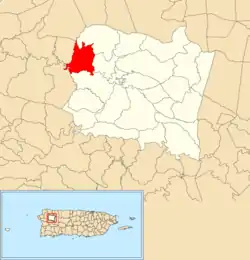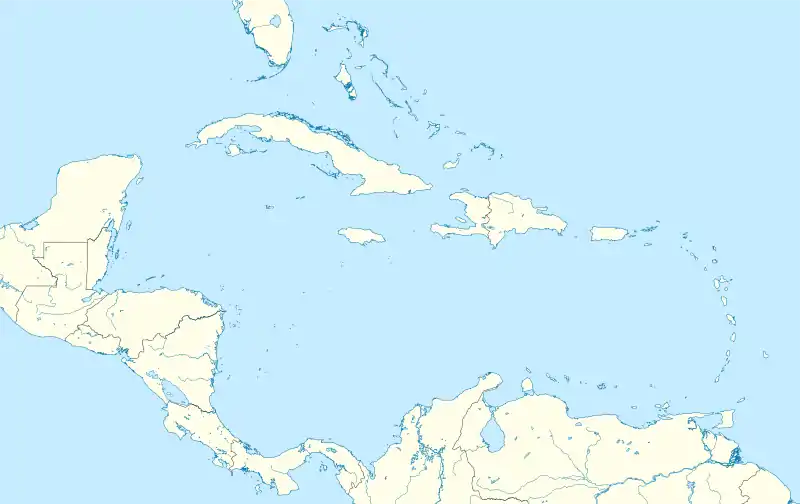Hato Arriba, San Sebastián, Puerto Rico
Hato Arriba is a barrio in the municipality of San Sebastián, Puerto Rico. Its population in 2010 was 1,980.[3][4][5]
Hato Arriba | |
|---|---|
Barrio | |
 Location of Hato Arriba within the municipality of San Sebastián shown in red | |
 Hato Arriba Location of Puerto Rico | |
| Coordinates: 18°21′29″N 67°01′52″W[1] | |
| Commonwealth | |
| Municipality | |
| Area | |
| • Total | 2.96 sq mi (7.7 km2) |
| • Land | 2.96 sq mi (7.7 km2) |
| • Water | 0 sq mi (0 km2) |
| Elevation | 246 ft (75 m) |
| Population (2010) | |
| • Total | 1,980 |
| • Density | 668.9/sq mi (258.3/km2) |
| Source: 2010 Census | |
| Time zone | UTC−4 (AST) |
History
Puerto Rico was ceded by Spain in the aftermath of the Spanish–American War under the terms of the Treaty of Paris of 1898 and became an unincorporated territory of the United States. In 1899, the United States conducted its first census of Puerto Rico finding that the population of Hato Arriba barrio was 663.[6]
| Historical population | |||
|---|---|---|---|
| Census | Pop. | %± | |
| 1980 | 1,467 | — | |
| 1990 | 1,728 | 17.8% | |
| 2000 | 1,991 | 15.2% | |
| 2010 | 1,980 | −0.6% | |
| U.S. Decennial Census[7] 1899 (shown as 1900)[8] 1910-1930[9] 1930-1950[10] 1980-2000[11] 2010[12] | |||
PR-111 and PR-119
On September 20, 2017 a section of PR-111 in Hato Arriba "almost disappeared completed" according to witnesses of the effects of Hurricane Maria.[13] In late May 2019, a lane of PR-119, a principal road in Hato Arriba, collapsed due to heavy rain. This highway had experienced a visible depression with Hurricane Maria in 2017 and was on a project waiting list when it collapsed further.[14][15]
Sectors
Barrios (which are roughly comparable to minor civil divisions)[16] in turn are further subdivided into smaller local populated place areas/units called sectores (sectors in English). The types of sectores may vary, from normally sector to urbanización to reparto to barriada to residencial, among others.[17][18][19]
The following sectors are in Hato Arriba barrio:[20]
Carretera 111, Carretera 125, Carretera 423, Parcelas Hato Arriba, Sector Anglada, Sector Bernal, Sector Campo Alegre, Sector Caña Verde, Sector Cuesta La Luna, Sector Hoyo Frío, Sector Hoyo Santo, Sector Medina, Sector Nando Rivera, Sector Punta Brava, Sector Santo Torres, Urbanización Colinas de Hato Arriba, and Urbanización Lomas Verdes.
See also
References
- "US Gazetteer 2019". US Census. US Government.
- U.S. Geological Survey Geographic Names Information System: Hato Arriba barrio
- Picó, Rafael; Buitrago de Santiago, Zayda; Berrios, Hector H. Nueva geografía de Puerto Rico: física, económica, y social, por Rafael Picó. Con la colaboración de Zayda Buitrago de Santiago y Héctor H. Berrios. San Juan Editorial Universitaria, Universidad de Puerto Rico,1969.
- Gwillim Law (20 May 2015). Administrative Subdivisions of Countries: A Comprehensive World Reference, 1900 through 1998. McFarland. p. 300. ISBN 978-1-4766-0447-3. Retrieved 25 December 2018.
- Puerto Rico:2010:population and housing unit counts.pdf (PDF). U.S. Dept. of Commerce, Economics and Statistics Administration, U.S. Census Bureau. 2010.
- Joseph Prentiss Sanger; Henry Gannett; Walter Francis Willcox (1900). Informe sobre el censo de Puerto Rico, 1899, United States. War Dept. Porto Rico Census Office (in Spanish). Imprenta del gobierno. p. 160.
- "U.S. Decennial Census". United States Census Bureau. Archived from the original on February 13, 2020. Retrieved September 21, 2017.
- "Report of the Census of Porto Rico 1899". War Department Office Director Census of Porto Rico. Archived from the original on July 16, 2017. Retrieved September 21, 2017.
- "Table 3-Population of Municipalities: 1930 1920 and 1910" (PDF). United States Census Bureau. Archived (PDF) from the original on August 17, 2017. Retrieved September 21, 2017.
- "Table 4-Area and Population of Municipalities Urban and Rural: 1930 to 1950" (PDF). United States Census Bureau. Archived (PDF) from the original on August 30, 2015. Retrieved September 21, 2014.
- "Table 2 Population and Housing Units: 1960 to 2000" (PDF). United States Census Bureau. Archived (PDF) from the original on July 24, 2017. Retrieved September 21, 2017.
- Puerto Rico:2010:population and housing unit counts.pdf (PDF). U.S. Dept. of Commerce Economics and Statistics Administration U.S. Census Bureau. 2010. Archived (PDF) from the original on 2017-02-20. Retrieved 2019-08-02.
- Un cambio categoría 4 Memorias del huracán María (PDF). Centro Interdisciplinario de Estudios del Litoral Mayagüez, Puerto Rico. p. 22. ISBN 978-1-881719-75-5. Retrieved 4 November 2019.
- "Cierran varias carreteras tras fuertes lluvias". El Nuevo Dia (in Spanish). 29 May 2019.
- "Árboles caídos, ríos crecidos y carreteras cerradas en el oeste por las lluvias". Primera Hora (in Spanish). 29 May 2019.
- "US Census Barrio-Pueblo definition". factfinder.com. US Census. Archived from the original on 13 May 2017. Retrieved 5 January 2019.
- "Agencia: Oficina del Coordinador General para el Financiamiento Socioeconómico y la Autogestión (Proposed 2016 Budget)". Puerto Rico Budgets (in Spanish). Retrieved 28 June 2019.
- Rivera Quintero, Marcia (2014), El vuelo de la esperanza: Proyecto de las Comunidades Especiales Puerto Rico, 1997-2004 (first ed.), San Juan, Puerto Rico Fundación Sila M. Calderón, ISBN 978-0-9820806-1-0
- "Leyes del 2001". Lex Juris Puerto Rico (in Spanish). Retrieved 24 June 2020.
- "PRECINTO ELECTORAL SAN SEBASTIÁN 033" (PDF). Comisión Estatal de Elecciones (in Spanish). PR Government. 19 October 2018. Retrieved 19 June 2019.